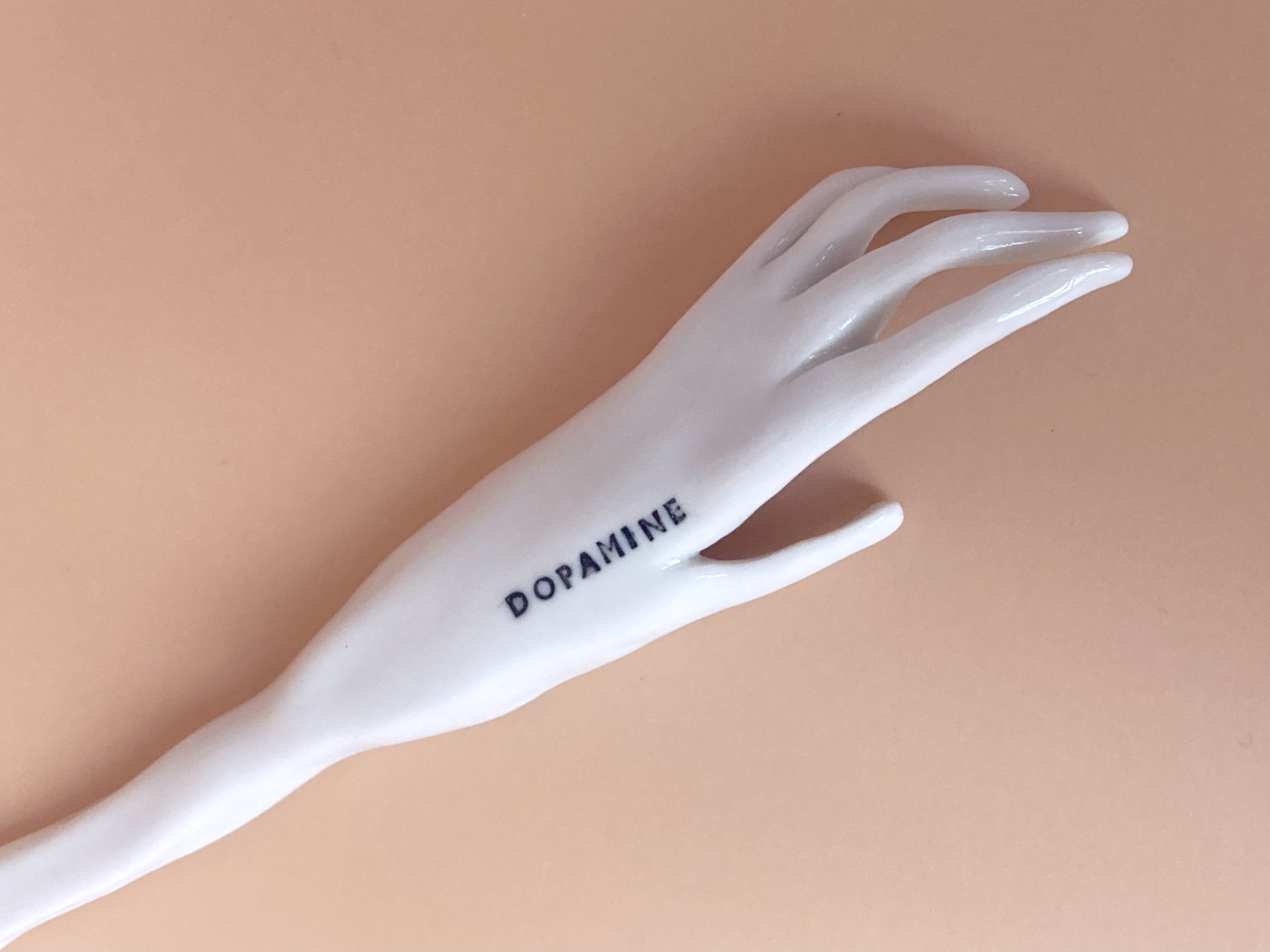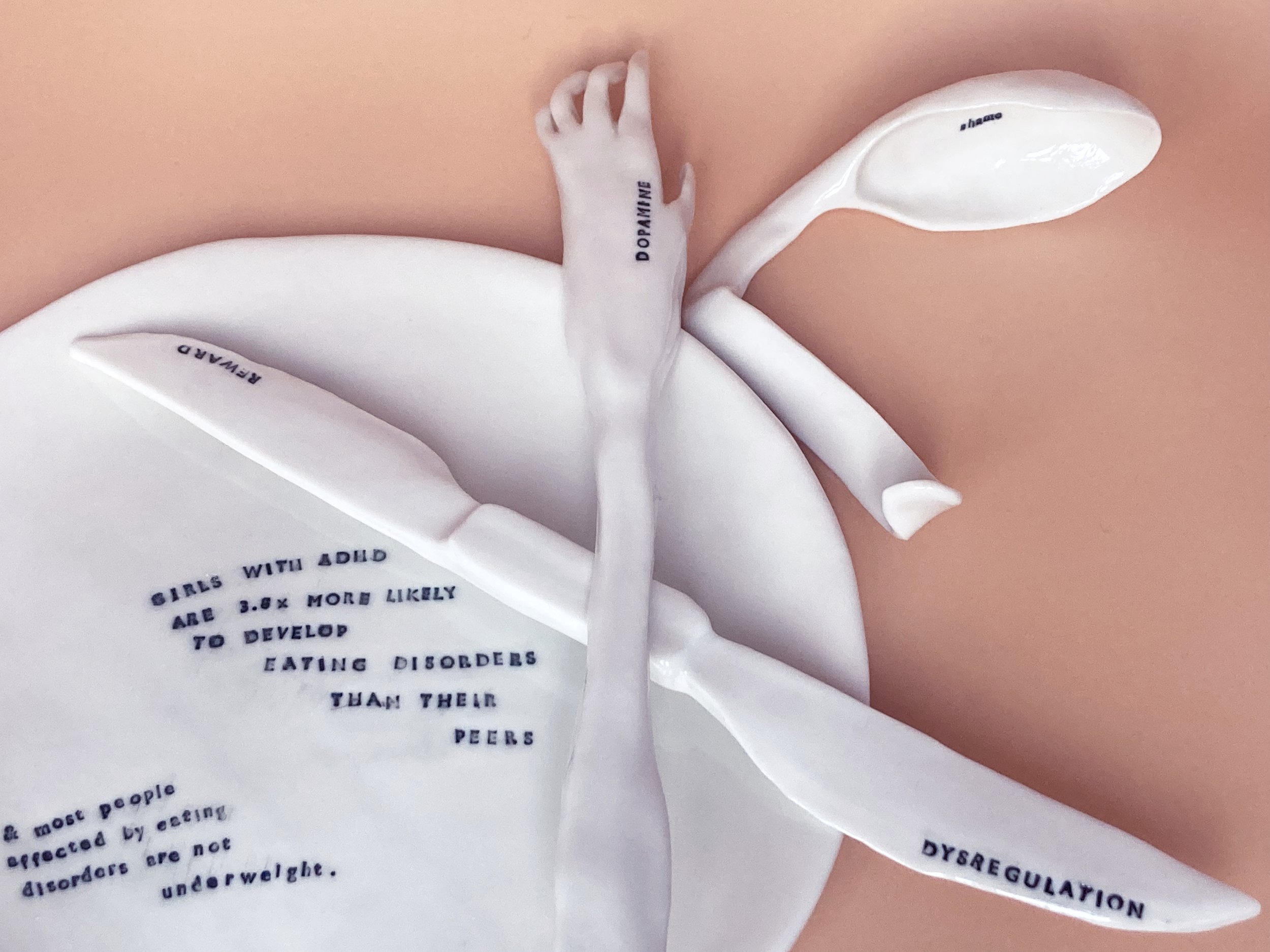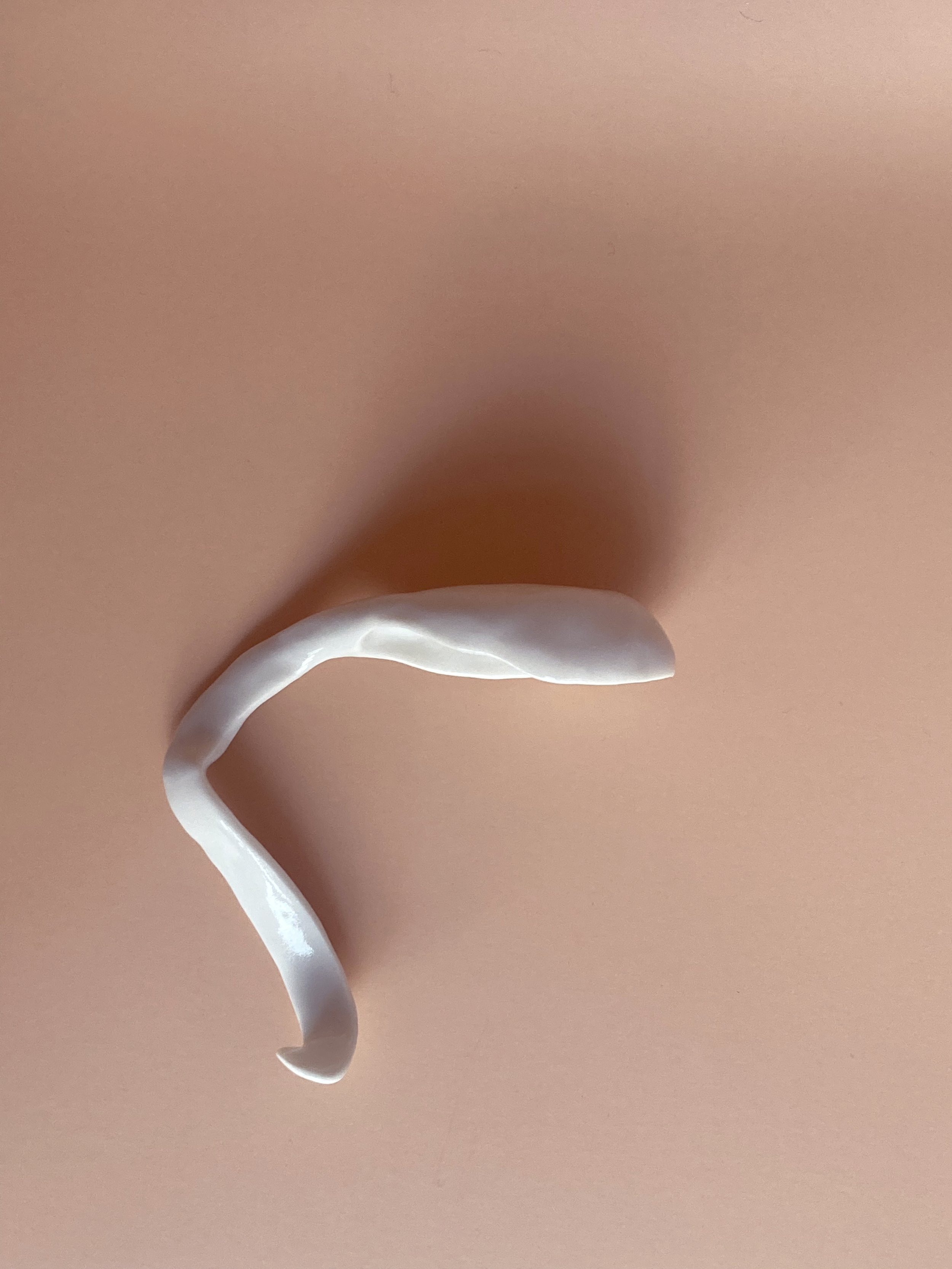
all we consume | body image research - Iteration 2
This autoethnographic illustration practice comes with a trigger warning as it explores poor body image experience and eating disorders within the childhood home. Though the autoethnographic object illustrations in Iteration 1 (that I cannot tell you either) respond to personal experience within a wider cultural context, this second iteration of object illustrations focuses more explicitly on collective cultural experience.
Audience discretion is advised.
Autoethnography is where a writer or illustrator/artist uses their personal experience as a way to critique broader cultural experiences and contribute to research.
These object illustrations and zines are part of my practice-based PhD research at Belfast School of Art, Ulster University. ‘Anti-aesthetics’ has a political affinity, and I use this approach to illustrate my working class identity and the political agenda of the work. Anti-aesthetics is used to decenter the artist, and although this work illustrates my personal experience, the politics of gender, racism, classism, and colonialism significantly shape my experience in the world. The anti-aesthetics also has political relevance to zines’ historical uses and culture.
The collages focus on the childhood home, the power dynamics, the intergenerational conversations and attitudes to women’s bodies in relation to western cultural discourse. The contested environment of the home, middle class sensibilities leading to an idealised version of reality, where secrets hide in the shadows, and sometimes in plain sight.
Through a series of Conversation Café inspired engagements with groups of women*, these collages, zines, and object illustrations will be conduits to generate critical discussion on western body image discourse, the racist roots of western ideals, and how these filter into transgenerational body image experiences in the home. These engagements are provisionally called Craftivist Clay sessions, as I aim to publish the model for others working with arts-based practices and methodologies to adopt and adapt.
If you are affected by the issues raised by this work, please reach out to:
Eating Disorders Association Northern Ireland
Beat
First Steps

dopamine (Part of ADHD girls) (2022)
Dopamine-reward-dysregulation-shame
Girls with ADHD are 3.8x more likely to develop eating disorders than their peers
& most people affected by eating disorders are not underweight
Environment and Neurobiology impact body image. Some ADHDers turn to food to increase dopamine, the feel good chemical. We can struggle to make decisions and recognise internal cues such as hunger and fullness. Food and weight can also feel like the only thing we can control when the rest of our life is in chaos. Body image and the ‘ideal’ can also feel like it’s another thing we are failing at, leading to feelings of shame.
(Handbuilt fork: porcelain, underglaze, glaze)

ADHD girls (2022)
Dopamine-reward-dysregulation-shame
Girls with ADHD are 3.8x more likely to develop eating disorders than their peers
& most people affected by eating disorders are not underweight
Environment and Neurobiology impact body image. Some ADHDers turn to food to increase dopamine, the feel good chemical. We can struggle to make decisions and recognise internal cues such as hunger and fullness. Food and weight can also feel like the only thing we can control when the rest of our life is in chaos. Body image and the ‘ideal’ can also feel like it’s another thing we are failing at, leading to feelings of shame.
(Handbuilt plate, knife, fork and spoon: porcelain, underglaze, glaze.)

shame (part of ADHD girls) (2022)
Dopamine-reward-dysregulation-shame
Girls with ADHD are 3.8x more likely to develop eating disorders than their peers
& most people affected by eating disorders are not underweight
Environment and Neurobiology impact body image. Some ADHDers turn to food to increase dopamine, the feel good chemical. We can struggle to make decisions and recognise internal cues such as hunger and fullness. Food and weight can also feel like the only thing we can control when the rest of our life is in chaos. Body image and the ‘ideal’ can also feel like it’s another thing we are failing at, leading to feelings of shame.

when will it stop (2022)
How we talk about
think about
see
value
women’s bodies
chips away at girls’ self esteem
when will it stop
(handbuilt bowl and spoon: porcelain, underglaze, glaze, ceramic decal).

when will it stop (2022)
How we talk about
think about
see
value
women’s bodies
chips away at girls’ self esteem
when will it stop
(handbuilt bowl and spoon: porcelain, underglaze, glaze, ceramic decals)
(Interior decal is a re-appropriated collage from my BA (Hons) Illustration final project, The Sexist’s Alphabet: R is for Rank).

when will it stop (2022)
How we talk about
think about
see
value
women’s bodies
chips away at girls’ self esteem
when will it stop
(handbuilt bowl and spoon: porcelain, underglaze, glaze, ceramic decal).

the silent scream (2022) (Later added to for Craftivist Clay engagement)
Quiet.
private, not public.
why don’t we talk about the menopause?
profound silence.
(Handbuilt sugar bowl: porcelain, underglaze, glaze, ceramic decal).
This piece is response to a conversation from the first Craftivist Clay engagement and a menopause magnet brought to the conversation table by a participant. This inspired a re-appropriation of a collage from my BA (Hons) Illustration final project, The Sexist’s Alphabet: Q is for Quiet; initially questioning the quiet around menstruation.

the silent scream (2022)
Quiet.
private, not public.
why don’t we talk about the menopause?
profound silence.
(Handbuilt sugar bowl: porcelain, underglaze, glaze, ceramic decal).
This piece is response to a conversation from the first Craftivist Clay engagement and a menopause magnet brought to the conversation table by a participant. This inspired a re-appropriation of a collage from my BA (Hons) Illustration final project, The Sexist’s Alphabet: Q is for Quiet; initially questioning the quiet around menstruation.

a lifetime (2022)
Most western women will experience body dissatisfaction
across all ages
across their whole lifetime
starting from 5 years old.
(Handbuilt cups: porcelain, underglaze, glaze, ceramic decals).

a lifetime (part of) (2022)
Most western women will experience body dissatisfaction
across all ages
across their whole lifetime
starting from 5 years old.
(Handbuilt cups: porcelain, underglaze, glaze, ceramic decals).

it's just a white man's construct
it’s not real…
it’s just a white man’s construct
and still,
it consumes us
(Handbuilt cup: porcelain, underglaze, glaze, ceramic decals).

it's just a white man's construct
it’s not real…
it’s just a white man’s construct
and still,
it consumes us
(Handbuilt cup: porcelain, underglaze, glaze, ceramic decals).

it's just a white man's construct (2022)
it’s not real…
it’s just a white man’s construct
and still,
it consumes us
(Handbuilt cup: porcelain, underglaze, glaze, ceramic decals).

WARNING: risk of persistent sitting pretty (2022)
Objectification Theory (Fredrickson and Roberts, 1997) builds upon John Berger’s Ways of Seeing to explain how women are acclimatised into viewing themselves from the outside, constantly seeing themselves as they are seen by others and how this impacts engagement and mental health.
(Handbuilit plate: porcelain, glaze, ceramic decal)

wasted ageing (2022)
A re-appropriated collage from my BA (Hons) Illustration final project, The Sexist’s Alphabet: Y is for Youth (2015).
Handbuilt bowl: porcelain, glaze, ceramic decal.

wasted ageing (2022)
Preserving the subtle creases on the exterior of the bowl that occurred during the handbuilding process.
Handbuilt bowl: porcelain, glaze, ceramic decal.

untitled-entitled-unacknowledged (2022)
why can white
women take
from black
culture
to fit
fleeting
beauty trends
…
to then try to bring back heroin chic…
*
I am a white woman and I don’t feel it is ethically responsible to represent women of colour in my work. If black or brown women want to directly inform what I can make based on their experience then I will, but I am not going to appropriate anyone’s experience or reach out in a tokenistic way. What I can and will do is look at culture, trends, and representations, and asky why things are the way they are, who benefits, and who it harms. It’s not accusing individuals, but it’s questioning the system that harms us all, but some more than most (although there are some very problematic women in privileged and influential positions). This object illustration references literature I am citing in my PhD research, but also responds to a conversation on this subject that came from the participants of the Craftivist Clay engagement. The conversation drew attention to how history can repeat itself through women’s bodies representing status.

untitled-entitled-unacknowledged (2022)
why can white
women take
from black
culture
to fit
fleeting
beauty trends
…
to then try to bring back heroin chic…
*
I am a white woman and I don’t feel it is ethically responsible to represent women of colour in my work. If black or brown women want to directly inform what I can make based on their experience then I will, but I am not going to appropriate anyone’s experience or reach out in a tokenistic way. What I can and will do is look at culture, trends, and representations, and asky why things are the way they are, who benefits, and who it harms. It’s not accusing individuals, but it’s questioning the system that harms us all, but some more than most (although there are some very problematic women in privileged and influential positions). This object illustration references literature I am citing in my PhD research, but also responds to a conversation on this subject that came from the participants of the Craftivist Clay engagement. The conversation drew attention to how history can repeat itself through women’s bodies representing status.


















